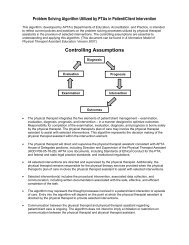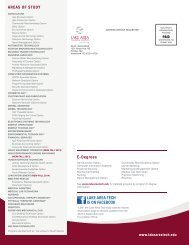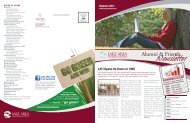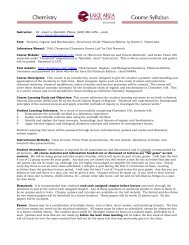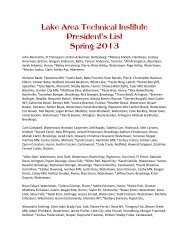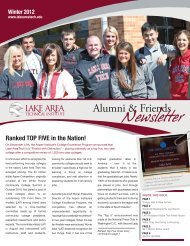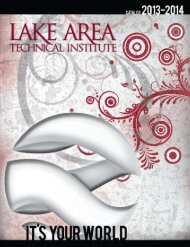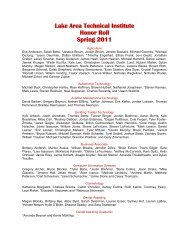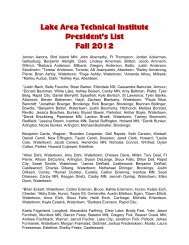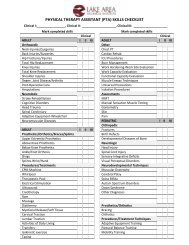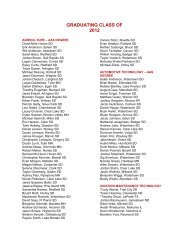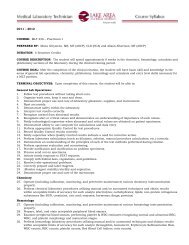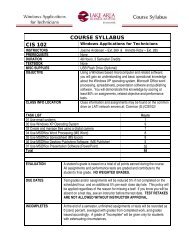Areas Of Study - Lake Area Technical Institute
Areas Of Study - Lake Area Technical Institute
Areas Of Study - Lake Area Technical Institute
You also want an ePaper? Increase the reach of your titles
YUMPU automatically turns print PDFs into web optimized ePapers that Google loves.
94<br />
PN 101 NURSING CONCEPTS A<br />
Includes a general orientation to all areas of care and provides<br />
a foundation of all basic procedures used in meeting the<br />
patient’s needs. A study of abbreviations and symbols is<br />
included. Also includes the study of drugs, methods of<br />
administration and dosage computation and provides<br />
in for ma tion on classifications, therapeutic action, and the<br />
side-effects of drugs. Students will gain experience giving<br />
med i ca tions throughout the program. 9 credits<br />
PN 105 NURSING CONCEPTS B<br />
The history of nursing, community health, nutrition, mental<br />
health and ge ri at ric nursing. Includes an introduction to<br />
improving health and pre vent ing illness in the community,<br />
the study of nutrients, the food pyramid, water electrolytes,<br />
and pH, with an emphasis on how good nutrition is essential<br />
in promoting physical and mental health. Also covers mental<br />
health and illness including causes and rehabilitation.<br />
Studies the normal aging process, chronic conditions of<br />
aging and care environments and covers the role of the<br />
nurse in prevention of problems facing this group.<br />
2 1/2 credits<br />
PN 110 MEDICAL TERMINOLOGY<br />
<strong>Study</strong> of medical terms, defining and recognizing words<br />
used in the health field. 1/2 credit<br />
PN 116 NURSING CONCEPTS C<br />
Covers the nursing of the childbearing family and children.<br />
The student will be introduced to the physiology and<br />
pregnancy, labor and delivery, the puerperium, fetal growth<br />
and development and the care of the newborn infant. Will<br />
also study the growth and de vel op ment from infancy to<br />
adolescence and the health prob lems of each age group.<br />
4 1/2 credits<br />
PN 121 NURSING CONCEPTS D<br />
Covers the nursing of the adult. Intro to the theory and<br />
practice of the physical, emotional, and spiritual needs<br />
of patients of all ages with common medical and surgical<br />
conditions that vary in severity. Also covers the role of<br />
the practical nurse in meeting the basic needs of patients<br />
in all stages of illness. Basic information concerning the<br />
effects of drugs, their uses and abuses are also studied.<br />
11 1/2 credits<br />
PN 130 PHARMACOLOGY<br />
The study of drugs, methods of administration and dosage<br />
com pu ta tion. Provides information on classifications, ther a-<br />
peu tic action, and side-effects of drugs. Provides experience<br />
giving medications throughout the program. 1 credit<br />
PN 200 NURSING CLINICAL<br />
A continuation of PN 121 in the clinical setting with<br />
exposure to more complex nursing situations in which more<br />
than one patient may be assigned. 4 credits<br />
PN 205 RESPONSIBILITIES OF THE LPN<br />
<strong>Study</strong> of personal, educational and vocational responsibilities<br />
in clud ing legal, ethical and spiritual aspects of communication.<br />
Also covered are issues of management including leadership,<br />
delegation, and conflict management. 1 credit<br />
PSYC 100 PSYCHOLOGY OF HUMAN RELATIONS<br />
This course is designed to help a student recognize the<br />
importance of adjusting and getting along as a member of a<br />
working team. It will examine the role personality plays in the<br />
work environment and the personal qualities, interpersonal<br />
skills and values that employers are looking for. 3 cred its<br />
PSYC 101 GENERAL PSYCHOLOGY*<br />
This course is an introduction survey to the field of<br />
psychology with consideration of the biological bases<br />
of behavior, sensory and perceptual processes, learning<br />
and memory, human growth and development, social<br />
behavior and normal and abnormal behavior. 3 cred its<br />
*College transferable.<br />
PSYC 111 APPLIED PSYCHOLOGY<br />
This course helps a student learn how to be a team member<br />
in a work environment. 1 cred it<br />
PSYC 251 ABNORMAL PSYCHOLOGY*<br />
A comprehensive study of abnormal personality behavior.<br />
Detailed ex am i na tion of the origin, symptoms and<br />
treatments of psychological disorders. 3 credits *College<br />
transferable.<br />
PTA 100 INTRODUCTION TO PHYSICAL THERAPIST<br />
AS SIST ING<br />
In introduction to the field of physical therapy. Covers<br />
history of the physical therapy profession, role and scope<br />
of PT/PTA, professional organization, educational and job<br />
opportunities, career decisions, confidentiality, licensure,<br />
physical therapy terminology, basic research procedures,<br />
multi-disciplinary team approach, communication within<br />
the healthcare fields, as well as current issues affecting the<br />
field of physical therapy. 2 credits<br />
PTA 106 KINESIOLOGY<br />
This course includes classroom instruction on basic<br />
kinesiological and biomechanical principles related to<br />
normal movement and their importance in understanding<br />
and implementing treatment programs. The course will<br />
provide an in-depth anatomy review with emphasis placed<br />
on musculoskeletal and neuromuscular relationships and<br />
function. Included in this course is gait analysis, with a focus<br />
on normal versus abnormal biomechanics. 3 credits<br />
PTA 110 FUNDAMENTALS OF PHYSICAL THERAPIST<br />
AS SIST ING<br />
This course will include lecture and classroom instruction<br />
on the fundamental skills of physical therapist assisting<br />
required for patient care and treatment. These skills include<br />
documentation of patient care; aseptic/sterile techniques<br />
as well as a review of universal precautions; preparation of<br />
the patient, treatment areas, and equipment; passive range<br />
of motion in the traditional planes as well as the diagonal;<br />
posture and body mechanics; patient transfers; gait training<br />
with or without assistive devices; wheelchairs and wheelchair<br />
mobility; architectural barriers, and activities of daily living.<br />
The primary focus of this class will be the lab; most of the<br />
skills are hands-on. 4 credits<br />
PTA 116 ETHICS AND ISSUES IN PHYSICAL THERAPY<br />
This course includes classroom instruction and discussion<br />
in ethics and important issues facing the physical therapy<br />
profession and health care in general. Topics will include<br />
medical law and ethics, multi-disciplinary team approach,<br />
standards for practice and ethical conduct, professional<br />
liability, medical malpractice, confidentiality, HIPPA,<br />
quality assurance, employment issues, fiscal considerations,<br />
and third-party payers. 2 credits<br />
PTA 120 OBSERVATION AND MEASUREMENT<br />
This course includes classroom and laboratory instruction on<br />
the basic assessment skills necessary for monitoring patient<br />
progress and safety, and for making recommendations for<br />
treatment modification. Assessment techniques include vital<br />
signs, goniometry, manual muscle testing, posture, segmental<br />
length, girth and volume, skin and sensory assessment and<br />
environmental assessment. 4 credits<br />
PTA 125 PHYSICAL AGENTS AND MASSAGE<br />
Includes classroom and lab instruction of the theory and<br />
techniques of applying physical therapy modalities including



